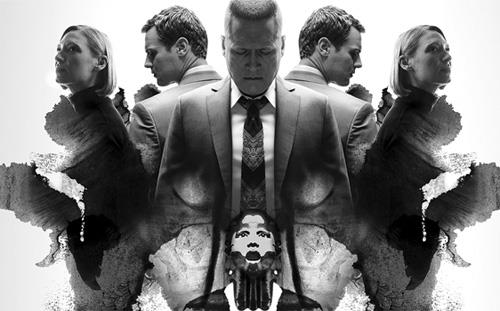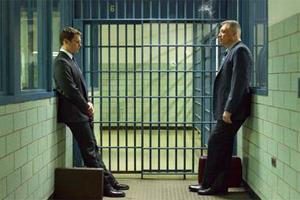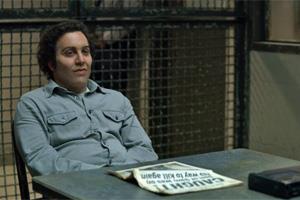
Firstly — and it pains me to have to say this, but these are the times we’re living in — this is a spoiler-free review. If you want to know before anyone else what happens in the new episodes, nine in all, of the long-awaited second season of Netflix’s Mindhunter, you won’t find out here. If you must know, there are plenty of spoilers all over social media.
This is a review that asks — and hopefully answers — the big-picture questions, such as whether Mindhunter’s second act lives up to the promise of the first, for those who appreciated it, and whether it will change the minds of those who sampled the first season and found it wanting.
The short answers, in order, are yes and no.
 Mindhunter was adapted for Netflix from the true-life book Mindhunter: Inside the FBI’s Elite Serial Crime Unit by retired special agent John E. Douglas — the Scott Glenn character in Silence of the Lambs — and journalist Mark Olshaker, and the Netflix version has aptly captured the quiet, brooding tension of the criminal mind.
Mindhunter was adapted for Netflix from the true-life book Mindhunter: Inside the FBI’s Elite Serial Crime Unit by retired special agent John E. Douglas — the Scott Glenn character in Silence of the Lambs — and journalist Mark Olshaker, and the Netflix version has aptly captured the quiet, brooding tension of the criminal mind.
It is very slow by TV standards — one reason, perhaps, why it could only have been made for Netflix, or HBO — and the tightly wound stories take a while in the telling. That’s true to real life, and Mindhunter is nothing if not realistic. Those who stayed glued to MIndhunter’s early episodes and appreciated those quiet, slow-to-evolve passages won’t be disappointed by the new episodes, which share a similar slow-to-boil pace and tone. The violence is suggested for the most part — this isn’t Criminal Minds— but it’s more disturbing for that. Being told about a crime is often more disturbing than watching the crime itself: Mindhunter’s makers are only too well aware that the imagination can paint a picture far more frightening than any dramatized recreation.
The first three episodes of the new season were directed by Se7en filmmaker and co-executive-producer David Fincher, and they stay true to Fincher’s style: dark lit and yet strangely stylized, full of slow-burning tension and a period song score that ranges from Roxy Music (In Every Dream a Heartache) and The Doobie Brothers (What a Fool Believes) in the season opener to, in Fincher’s third episode, Grace Jones (Warm Leatherette) and The Pretenders (Brass in Pocket).
Mindhunter takes place in the late 1970s and Fincher doesn’t let you forget it for a second. It’s stylish without being overly flashy, and you don’t have to have lived through the late ‘70s and early ‘80s to appreciate it. It helps, though. Fincher is from the post-MTV generation, but stylistically he clearly picked up a lot from Michael Mann’s 1986 thriller Manhunter with its keen sense of time and place. (Fun fact: William L. Petersen’s criminal profiler in Manhunter is a direct antecedent of Petersen’s Gil Grissom character in the original CSI, even down to his Manhunter character’s name, Will Graham. If you have a thing for serial-thrillers that are slow-paced and tightly wound, with a throbbing background score that has a way of getting under the skin, you owe it to yourself to watch Manhunter, if you haven’t already.)
 Netflix is no stranger to long-form TV and the pitfalls that can bring. The new season’s first episode — Mindhunter doesn’t use episode titles, just episode numbers — both recaps the first season and lays the groundwork for the episodes to come. While the tension is there, and Fincher reclaims his sense of visual style and penchant for interior monologue, the emphasis isn’t so much on a crime as it is office politics. The FBI’s Behavioral Science Unit has a new boss, and the word from above is about to shift in tone for increasingly world-weary FBI veteran Bill Tench (Holt McCallany, top, terrific in the role), gifted but overly-sensitive newbie Holden Ford (Jonathan Groff, top), now beset by panic attacks, and clinical psychologist and college professor — aka the outsider, the academic no one entirely trusts — Wendy Carr (Anna Torv, top, understated and utterly believable in the cool, detached way of someone who reveals nothing and yet knows a lot more than she’s letting on).
Netflix is no stranger to long-form TV and the pitfalls that can bring. The new season’s first episode — Mindhunter doesn’t use episode titles, just episode numbers — both recaps the first season and lays the groundwork for the episodes to come. While the tension is there, and Fincher reclaims his sense of visual style and penchant for interior monologue, the emphasis isn’t so much on a crime as it is office politics. The FBI’s Behavioral Science Unit has a new boss, and the word from above is about to shift in tone for increasingly world-weary FBI veteran Bill Tench (Holt McCallany, top, terrific in the role), gifted but overly-sensitive newbie Holden Ford (Jonathan Groff, top), now beset by panic attacks, and clinical psychologist and college professor — aka the outsider, the academic no one entirely trusts — Wendy Carr (Anna Torv, top, understated and utterly believable in the cool, detached way of someone who reveals nothing and yet knows a lot more than she’s letting on).
Mindhunter is well-written, so nothing about the new boss is at it seems: He seems supportive and says all the right things, but still, the viewer is left with an unsettling feeling that not everything is going to play out as expected. Everyone has a boss, and the thing about bosses is that they keep changing. The new one is never quite the same, for better or worse.
It isn’t until the third episode that the new season’s main mystery is brought into focus: The 1979-’81 Atlanta child murders. This hints at Mindhunter’s greatest strengths, but also its most serious weaknesses. It plays like fiction — Fincher made Se7en, after all — but is based on true-life crimes. Douglas’ book is a biography, however, and the trouble with dramatization is that we already know how things play out in the end.
This has already caused controversy in the mainstream press and in the real world, even though the latest season of Mindhunter has only been out for a few days now.
Mindhunter’s makers went ahead without consulting any of the families of the Atlanta child murder victims, some 28 African-American child victims in all. Two of those families are featured prominently in the Mindhunter episodes, Camille Bell, mother of nine-year-old Yusuf Bell, found dead in 1979, and Venus Taylor, mother of 12-year-old Angel Lenair, found in 1980. (I’ve named the victims because, too often, they are forgotten once the TV story has been told.)
Mindhunter is operating on tricky ground here. On the one hand, it’s not documentary — and it doesn’t claim to be — and yet it’s so carefully made, with genuine style and real creativity, with such consummate acting and with such a burning sense of social urgency and racial injustice that it demands to be taken seriously.
For all Fincher’s powerful visual sense and ear for the way real people talk — the interrogation scenes and the tête-à-tête between law-enforcement officials inside the walls of FBI headquarters in Quantico, Va. are exactly as one imagines them to be, adult and serious — there’s nothing overbearing or mannered about what, after all, is just a Netflix crime drama.
 Fictionalized versions of real-life serial killers Ed Kemper (Cameron Britton) and David Berkowitz (Oliver Cooper, left), thankfully safely put away under lock-and-key at this point, make a return in Mindhunter’s early-season episodes, but by the third hour, it’s clear who the focus is going to be on.
Fictionalized versions of real-life serial killers Ed Kemper (Cameron Britton) and David Berkowitz (Oliver Cooper, left), thankfully safely put away under lock-and-key at this point, make a return in Mindhunter’s early-season episodes, but by the third hour, it’s clear who the focus is going to be on.
Mindhunter’s second season is unlikely to disappoint those who appreciated those first-season episodes when it was hard to tell exactly what it was or where it was going. This is gripping, addictive drama at its finest.
That said, these new episodes won’t win any new converts either, certainly not those viewers who tried it the first time and didn’t care for what they saw. Unlike its deranged, deluded serial-killer subjects, Mindhunter is absolutely clear about what it is, and who it’s for.
For me, it’s a reminder of just how good Netflix can be when it’s at its best.